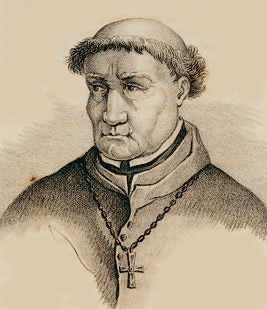| Tomás de Torquemada | |
|---|---|
 Tomás de Torquemada | |
| Born | 1420 Valladolid, Spain |
| Died | September 16, 1498 Ávila, Spain |
| Occupation | Inquisitor General |
Biography
Tomás de Torquemada was born in Valladolid, Castile-Leon, Spain. He was the Grand Inquisitor of Spain for many years, leaving to posterity an extraordinary picture of fanaticism and implacability. In the fifteen years of his direction the Spanish Inquisition grew from the single tribunal at Seville to a network of two dozen 'Holy Offices'" [2].
After early service as a monk and cook at the Dominican monastery in Valladolid, Torquemada eventually became advisor to the monarchs — Ferdinand and Isabella. He was especially well regarded by Queen Isabella, whose confessor he had been, and who had him appointed Inquisitor General in 1483. In 1492 he was one of the chief supporters of the Alhambra decree, which resulted in the mass expulsion of non-Catholic Jews from Spain.
Every Spanish Christian over the age of twelve (for girls) and fourteen (for boys) was accountable to the Inquisition. Those who had converted from Judaism or Islam but who were suspected of secretly practicing their old rites, as well as others holding or acting on religious views contrary to Catholicism, were targeted. Anyone who spoke against the Inquisition could fall under suspicion - as did saints Teresa of Avila and John of the Cross. To stem the spread of heresy and anti-Catholicism, Torquemada promoted the burning of non-Catholic literature, especially the Talmud and, after the final defeat of the Moors at Granada in 1492, Arabic books as well.[citation needed]
Many Spaniards, looking back on the history of the reconquista, believed that the Jews of 15th century Spain were a subversive body. The King and Queen had decided on Catholicism as being the unifying feature of their reign. They were concerned that Jews had been granted too many "privileges" by previous monarchs and were working to undermine their government as well as stirring up trouble among the conversos. This basic distrust for Jews, converts and otherwise, as well as the dubious sincerity of Moorish converts, was a driving factor in the implementation of the Spanish Inquisition.[dubious ] Although the Inquisition is often viewed as being directed against Jews, in fact it had no jurisdiction or authority over unconverted Jews, or Muslims. Only baptised Christians faced investigation; and of those called to appear before the Holy Office, most were released after their first hearing without further incident.
While the Spanish Inquisition is generally denounced by historians for its use of torture, anonymous denunciation, and handing over convicted heretics to the government (auto-da-fe) for punishment, little of this can be described as unusual for the times. But, accusations of excess can be supported by reference to Pope Sixtus IV's observation, early in 1482 (before Torquemada's appointment as Grand Inquisitor) that the Inquisitional Office at Seville, "without observing juridical prescriptions, have detained many persons in violation of justice, punishing them by severe tortures and imputing to them, without foundation, the crime of heresy, and despoiling of their wealth those sentenced to death, in such form that a great number of them have come to the Apostolic See, fleeing from such excessive rigor and protesting their orthodoxy."[citation needed]
So hated did he become that at one point Torquemada traveled with a bodyguard of 50 mounted guards and 250 armed men. After 15 years as Spain's Grand Inquisitor, he died in 1498 in Ávila. For his role in the Spanish Inquisition, Torquemada's name has become a byword for fanaticism in the service of the Catholic religion.
Torquemada was a complex man: a ferocious zealot, he was also, ironically, the main reformer of the Spanish Inquisition - working to eliminate judicial corruption, bribery, false accusation and perjury. e.g., anyone found bearing false witness against another incurred the penalty due the one falsely accused. No respecter of rank, nobles, bishops and even a prince were called to appear before his Inquisition. He strongly supported the use of torture, but at the same time limited its practice. An early example of a penal reformer, Torquemada cleaned up the Inquisition's jails and saw to it that the prisoners were properly fed and clothed. A telling measure of his efforts can be seen wherein the numbers of common criminals petitioning to get their cases transferred to ecclesiastical courts became an administrative problem.
While generally inflexible and severe in his dealings with those he viewed as the enemies of Catholicism, especially relapsed heretics, Torquemada's main interest was in peaceably reconciling errant Catholics to the Church. His personal life was ascetic and he was regarded by even his enemies as incorruptible.
In 1832 Torquemada's tomb was ransacked, and his bones stolen and burned.

No hay comentarios:
Publicar un comentario